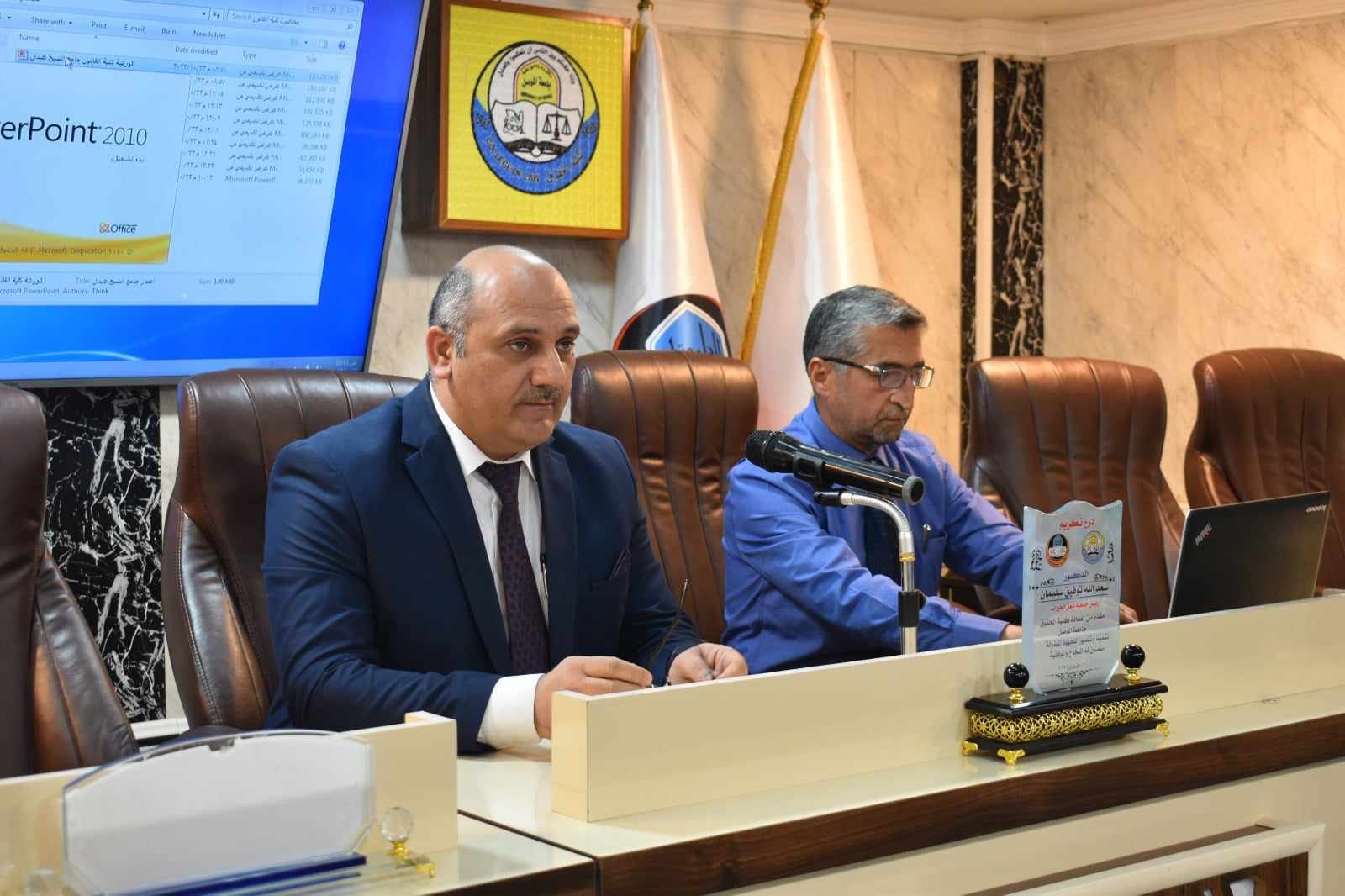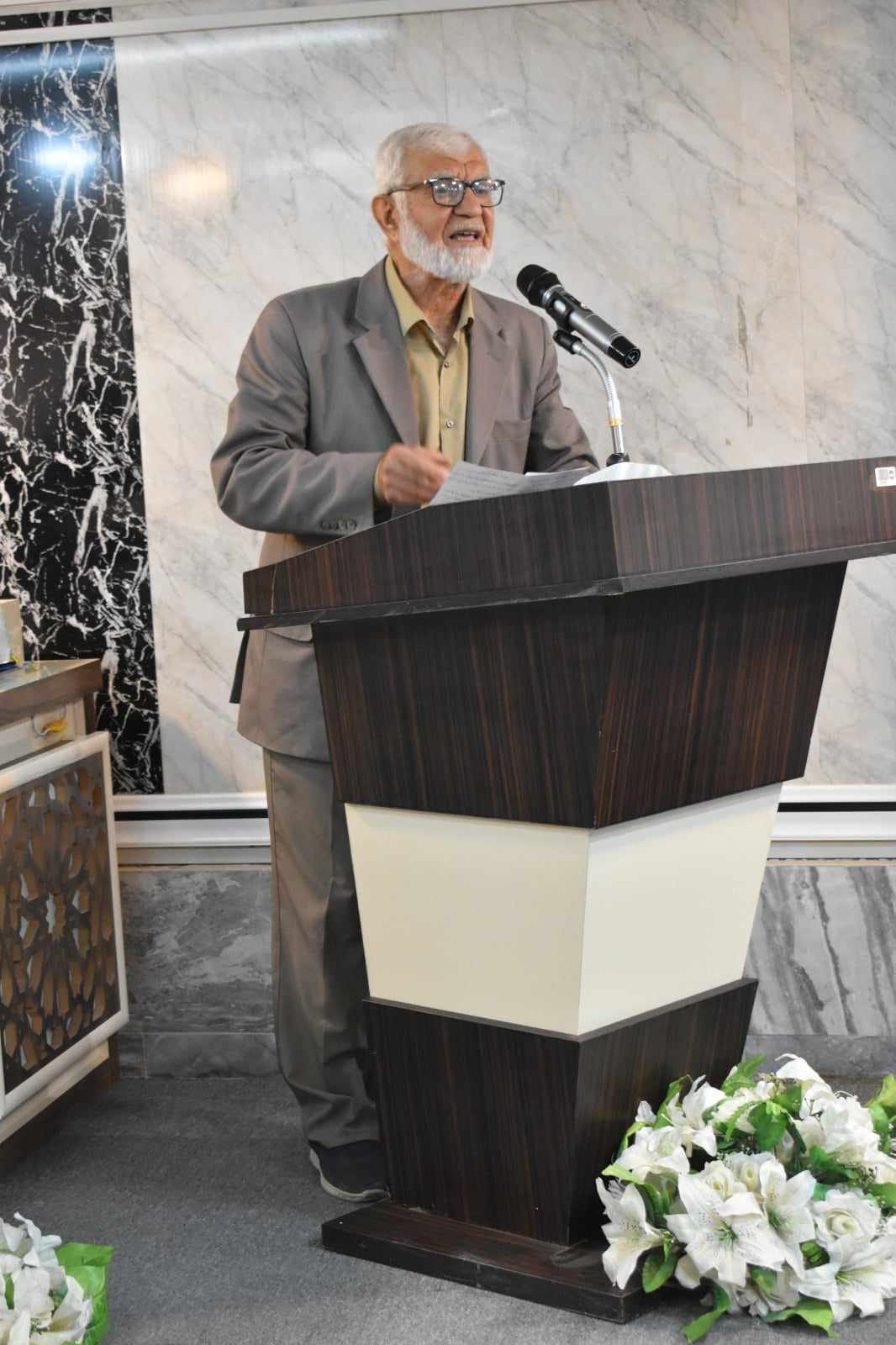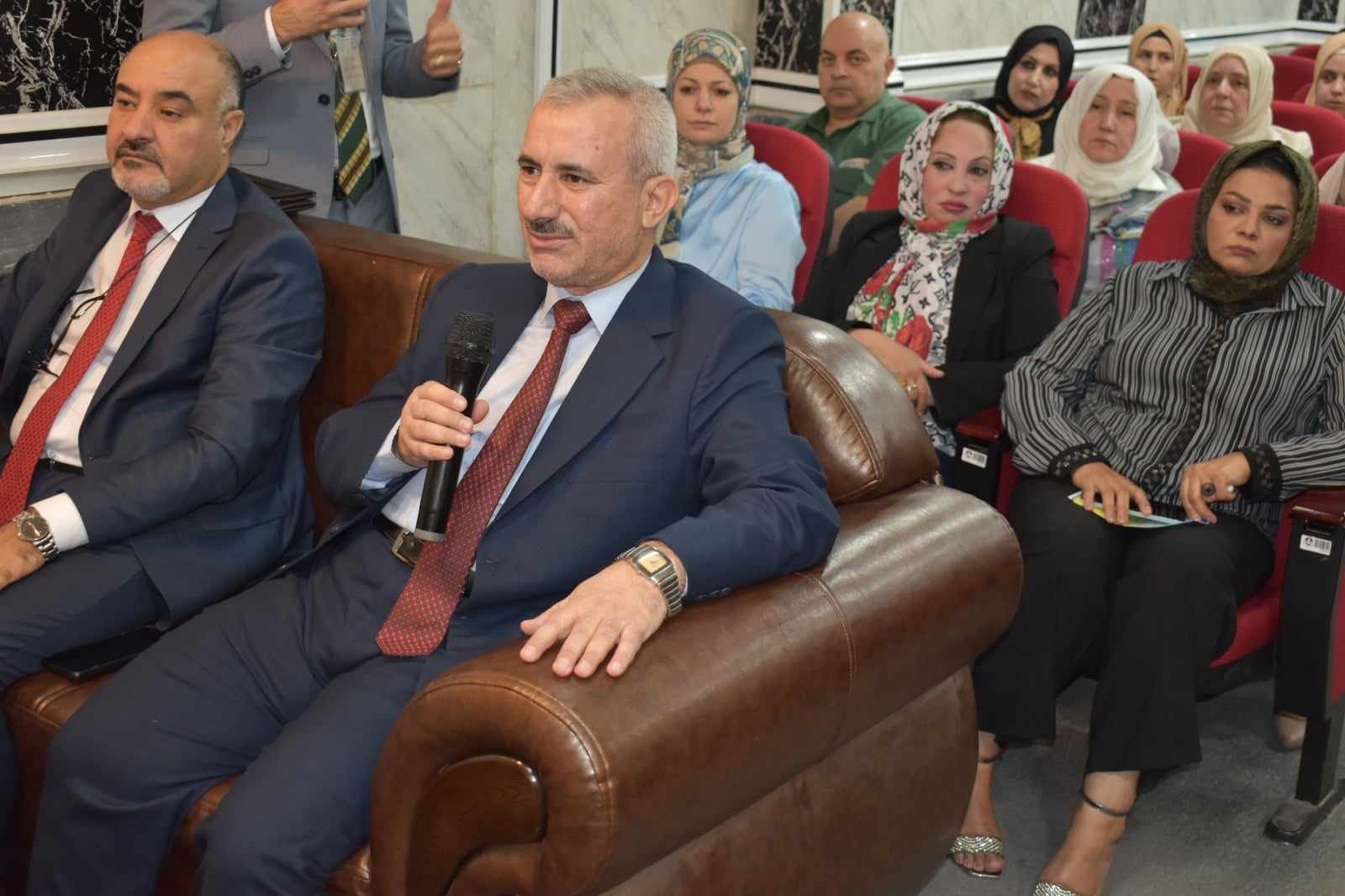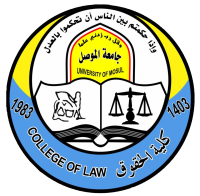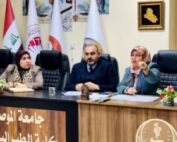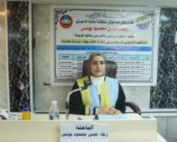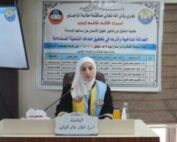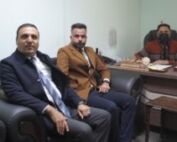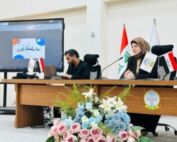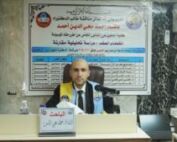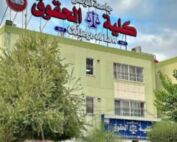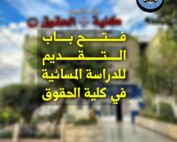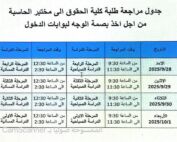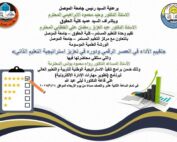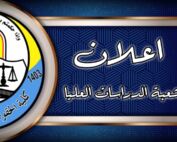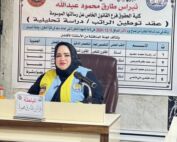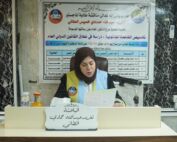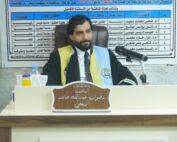27 October، 2023
Scientific workshop
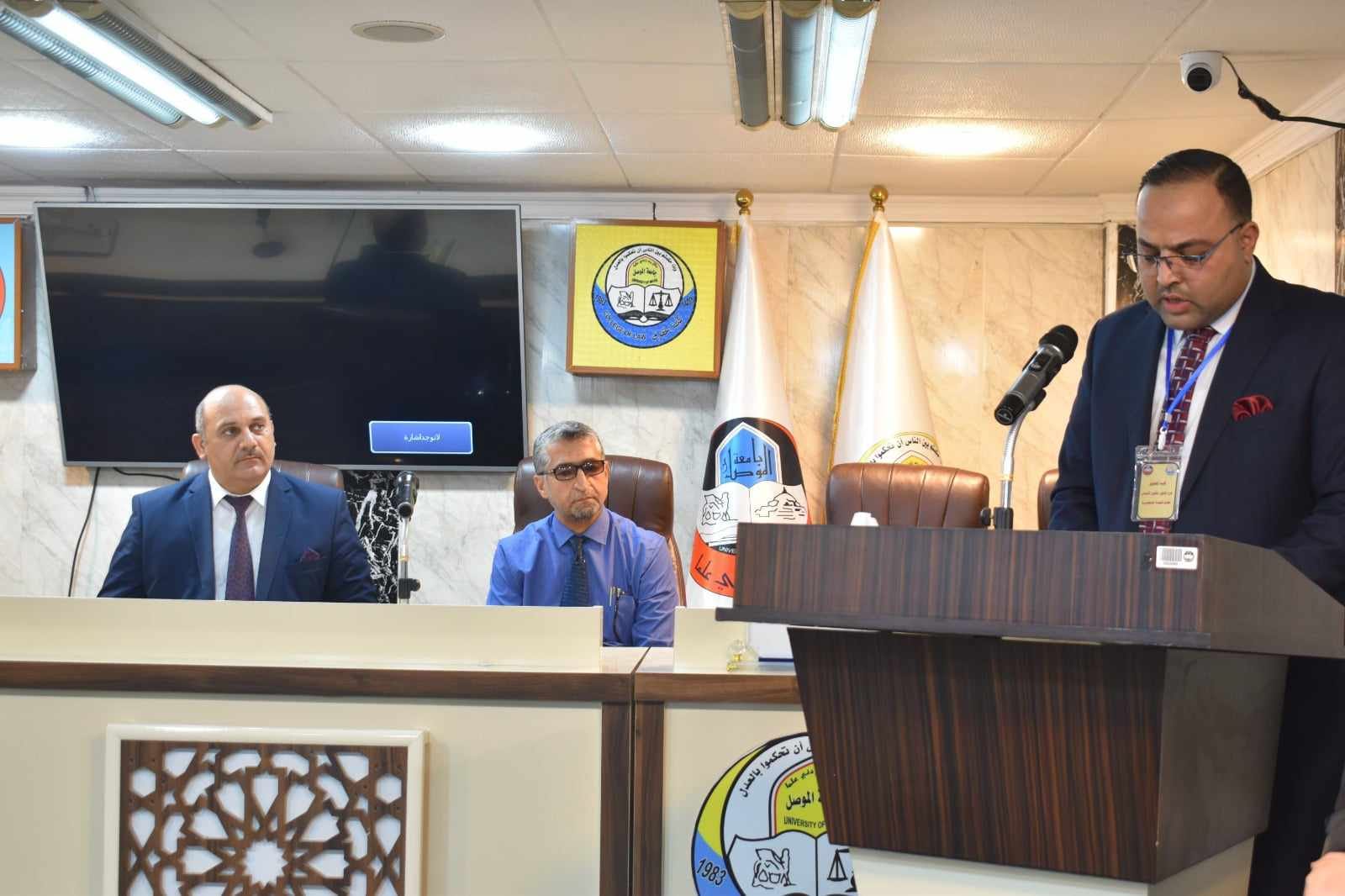
A scientific workshop on preserving heritage and religious objects after armed conflicts – Nineveh as a model,,,
Under the sponsorship of Professor Dr. Qusay Kamal al-Din al-Ahmadi, President of the University of Mosul, in the presence of a number of members of the University of Mosul Council, and Professor Dr. Ammar Saadoun Hamid, Assistant President of the University of Nineveh for Administrative Affairs, and with the follow-up of Assistant Professor Dr. Wissam Nemat Ibrahim al-Saadi, Dean of the College of Law at the University of Mosul, and members of the College Council, the Law Branch was established. Human beings in our college on Tuesday, October 24, 2023, in cooperation with the Department of Architecture at the College of Engineering/University of Mosul, held its scientific workshop entitled (Preserving heritage and religious objects after armed conflicts/Nineveh as a model), which aims to highlight the legal awareness of the parties to armed conflicts of the importance of protecting cultural and religious objects during… Armed conflicts and taking responsibility for rebuilding them and preserving cultural and religious identity after armed conflicts and highlighting international agreements and national laws to preserve cultural and religious objects after armed conflicts by preserving the geometric architectural form in rebuilding. The workshop opened its work by reading Surat Al-Fatihah to the souls. The martyrs of Iraq and the martyrs of Gaza. Then, Professor Dr. Saadallah Tawfiq Suleiman, former President of the University of Mosul and President of the Doing Charitable Society, gave his speech in which he welcomed the honorable audience, explaining the meaning of life from the perspective of Islam and its tolerant law, in accordance with what was stated in the texts of the Holy Qur’an, referring to the righteous predecessors, indicating their exploits, ideas, principles, and behavior, pointing to The instructions of Islam, which emphasized social and community solidarity, referring to the honorable biography of the Prophet, which emphasized the principles of affection, love, justice for the oppressed, and retaliation for the oppressor, indicating the role of the local government in Mosul and the central government in Baghdad in their combined efforts in working to rebuild Mosul and its monuments and heritage, which witnessed damage as a result of the tyranny of ISIS. Darkness. The workshop had two axes: a legal axis in which Dr. Wissam Nemat Ibrahim al-Saadi addressed the international and regional conventions that stipulate the preservation of cultural and religious objects during armed conflicts. He also referred to the voluntary efforts of the people of Nineveh Governorate in working on the reconstruction of cultural and religious objects in addition to The efforts made by charitable organizations that had a prominent role in reviving Mosul’s heritage, which expresses Mosul’s cultural and civilizational identity, as well as its contribution to community interaction, considering it a cultural heritage that must be protected and preserved, pointing to the Geneva and Hague Conventions and the clauses, provisions and rules they contained that obligated the warring parties to preserve Cultural objects and property during armed conflicts, pointing to the protection mechanism approved by international law for cultural property and objects, explaining the role of international organizations and their efforts to register cultural properties and objects in order to avoid attacks on them by both parties to the conflict, pointing to national legislation and procedures that guarantee the provision of protection for all that is considered heritage and inherited. Al-Hadhari, referring to Nineveh Governorate and the attacks on its cultural property by the brutal and oppressive gangs of ISIS, the terrorist organization that destroyed many of Nineveh’s antiquities and bulldozed and stole them, indicating the role of the UNESCO Chair at the University of Mosul in preserving antiquities and heritage and working to revive the Spirit of Mosul initiative, as well as the contribution of the Nineveh Antiquities Inspectorate. In working to restore the monuments of Nineveh, which were vandalized and destroyed by the hand of terrorism, then Dr. Ahmed Al-Omari, a lecturer in the Department of Architecture at the College of Engineering at the University of Mosul, addressed the engineering axis in which he explained the role of architecture in preserving the cultural and religious identities of Nineveh Governorate through the reconstruction of places of worship and houses. Old Mosul, indicating the role of the Do Charity Association of Mosul in field contributions to the reconstruction of archaeological sites that were ruined and destroyed by the dark terrorism of ISIS, stressing the effort to rebuild in a way that adds beauty to the site while preserving its history and heritage splendor, showing a video film in which he explains the extent of the destruction that affected some sites. He highlighted the archaeological and efforts made to rebuild it, pointing to the governmental efforts in effectively contributing to the reconstruction of Nineveh, its history, civilization and heritage, which expresses the specificity of the Iraqi identity extending for thousands of years. The workshop witnessed a distinguished presence of academics, researchers, and those interested in legal and societal affairs, in addition to college students and representatives of civil society organizations who showed remarkable interaction. On the topic of the workshop, we asked many questions and inquiries about its topic, which were answered in detail by those in charge of it. In conclusion, the Deanship of the College of Law honored Professor Dr. Saadallah Tawfiq Suleiman, former President of the University of Mosul and President of the Mosul Charitable Society, for his distinguished efforts in serving Mosul, its people, its antiquities, and its heritage, considering it a center. In terms of civilization and human heritage, it presented to all humanity a living model of man’s departure from the rubble of war and destruction to the process of construction and reconstruction for the humpbacked Nineveh, with its safe and victorious return, embracing its brave sisters, the rest of the provinces of our proud Iraq, with the arms of heroes and with the blood of the martyrs of our brave armed forces, our proud security services, and our steadfast crowds. The Dean of the College also honored Dr. Ahmed Al-Omari and the President of The members of the preparatory committee for the workshop received certificates of appreciation, and the workshop came up with recommendations that emphasized support for local and international efforts in reconstructing archaeological and heritage areas and praising the history and civilization of Nineveh.